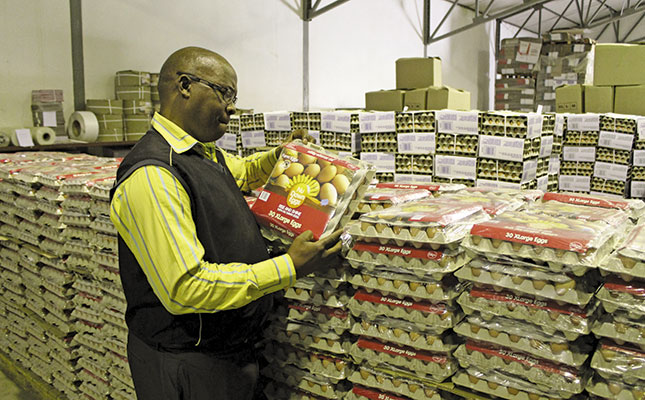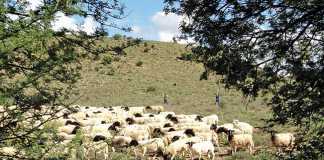
Photo: Lloyd Phillips
Producing, packing, marketing and distributing over 306 000 eggs in a seven-hour working day may not be a particularly impressive achievement for a corporate-scale commercial egg producer. But it’s no mean feat for an independent producer and packing warehouse.
Yet almost every day of the year, Nu Dawn Eggs (NDE) attains these figures on its premises outside Winterton. What also makes the company unusual is that it has had a majority black shareholding since 2001, and been black-owned since 2008.
READ: Small-scale egg production
Seo Mtetwa, managing director and majority shareholder, explains that the business, which was under the Nulaid Eggs division of Pioneer Foods, was made available for sale to employees of Pioneer in 2001.
“With Pioneer Foods’ support, Gerald Shabalala, Philani Dlamini, Colin le Roux, Veni Govender and I secured a loan with Boland bank – now Nedbank – to buy it,” says Seo. “We changed the name to uKhahlamba Poultry Farm (UPF) and from 2001 to 2008, collectively owned UPF and had a contract to supply table eggs solely to Pioneer Foods.”
In 2008, UPF underwent major changes, including the withdrawal of a number of shareholders. This left Seo as majority shareholder and farm manager Philani holding the remainder. UPF also decided that it would no longer supply Pioneer Foods but start selling table eggs directly to the market. With this, UPF’s Nu Dawn Eggs brand was born. NDE transferred the balance of the loan to Absa Bank and arranged to have it fully paid off by 2020.
“Our capacity and breed of layer hens has remained unchanged since 2001,” explains Seo. “We still have 403 200 Lohmann Silver and Lohmann Brown layers. But we intend changing soon to Dekalb Amberlink layer. Since 2008, we’ve been sourcing our pullets from Inverness Pullet Rearing near Mooi River.
We’ve established a good relationship with Robbie Kruger and when he decided to change to Amberlink hens, we trusted his judgement and changed to the breed too.” He admits, however, that this might need a few or no management changes.
Management and production at Nu Dawn Eggs
Nu Dawn Eggs has over 400 000 hens in 10 houses, and supplies retailers and hawkers with a range of products across KZN and as far as Mthatha in the Eastern Cape. Seo is intimately involved in the day-to-day operation of the farm, and makes sure he does not remain desk-bound.
Point-of-lay pullets arrive at Nu Dawn Eggs when they are at 18 weeks, and spend 54 weeks in egg production before being culled at 72 weeks. The culled hens are then sold live in bulk to buyers, mainly from the KZN South Coast area. Every five weeks, NDE culls out a house, cleans it and places new pullets.
“The table egg market is extremely competitive so I don’t want to highlight our business’s break-even point,” says Mtetwa. “But we are satisfied if a hen produces 293 eggs during its 54 weeks on our farm.
“We remain committed to Robbie as our supplier. We can’t simply change suppliers, because commitments from both supplier and producer are vital for the success of their respective businesses.
“I have to provide our pullet placement programme to Robbie 12 to 14 months in advance so he can plan his chick placement and rearing programme accordingly.”
Costs
As with most agricultural enterprises, input costs play a major role in profitability. NDE’s production and profitability are volume-linked, so inputs must be of high quality as not to affect production negatively.
READ: The cost of adhering to chicken welfare practices
“Feed accounts for 59% of our total production cost. We use about 1 000t of layer feed a month: layer phase 1 for hens 18 to 46 weeks old, layer phase 2 for 47 to 60 weeks old, and layer phase 3 from 61 weeks until culling,” he explains.
“The next most expensive input is point-of-lay purchases at about 29%. The balance is labour, packaging, distribution, electricity, maintenance and veterinary products.”
With feed component being NDE’s highest single cost, Seo continually compares the prices of various feed suppliers to buy the most cost-effective feed. He buys from reputable suppliers only.
“When we give the hens inferior quality feed, egg production declines immediately. And if we get fewer eggs, our profitability is compromised,” he explains.
Seo chooses not to disclose the company’s finances, as the commercial table egg industry is highly competitive. He stresses, however, that his company has an advantage over other producers as it is comparatively large. It has “online production” in that the eggs are fed directly to the packhouse via an automated egg conveyor belt system. The house can grade, pack and store 850 cases of eggs – a total of 306 000 eggs – in a seven-hour working day, with plenty of capacity in reserve.
NDE operates a fleet of trucks – two eight-tonners, four five-tonners and a two-tonner – to deliver to clients from Monday to Saturday. The marketable eggs range in size from small/pullets (less than 42 g), medium (43g to 50g), large (51g to 58g), extra large (59g to 65g), jumbo (66g to 70g) and super jumbo (greater than 70g).
These are packed into configurations such as the common pack (2 x 6 eggs), the 1½ dozen pack (18 eggs), the four-dozen pack (48 eggs), the tray (30 eggs), and the taxi pack (60 eggs).
“Our small/pullet eggs are targeted at cost-conscious buyers mostly found in the informal hawker sector,” he explains. “The medium to jumbo eggs go to major retail and independent stores in KwaZulu-Natal and Mthatha. We get only a few super jumbo eggs, which are mostly sold to our staff,” he says.
A tough market
Seo points out that competition in the table egg market is the main challenge facing Nu Dawn Eggs.
“Some producers make irresponsible decisions regarding prices. They try to undercut the rest of the industry by starting a price war. Eggs are perishable, so when prices are uneconomical to the rest of the industry during a price war, we are forced to sell surplus eggs at a sub-economical price.
“We just have to bite the bullet until the producer undercutting the market either goes under or is forced by economics to increase its price back to a more realistic level.”
Another challenge, according to Seo, is when a table egg buyer plays independent producers against one another.
“They even make up an artificial price to try and force suppliers to drop prices to maintain off-take. Due to competition legislation, producers may not get together to discuss this issue and then approach such buyers collectively to highlight their concerns.”
Biosecurity threats
Despite having installed a variety of biosecurity measures, Nu Dawn Eggs, like all egg producers, continually faces the threat of disease breaking out amongst its layers. While people and equipment entering premises are controlled and disinfected, it is impossible to limit access to wild birds and rodents. Even layer feed can contain contaminants that could severely undermine production.
To counter these threats, Nu Dawn Eggs contracts a Pietermaritzburg-based veterinarian who specialises in poultry health management. The company has also implemented a strict vaccination programme against Newcastle disease, gumboro, mycoplasma and infectious bronchitis. While some of these diseases may not be fatal to the infected hens, they can cause them to lay misshapen eggs that are unmarketable.
READ: Are your chickens healthy?
A final major challenge is to remain on top of the market’s demands. Management therefore maintains constant communications with buyers to establish and satisfy their requirements.
“If we don’t, our competitors will. Establishing and maintaining a sound relationship with buyers goes a long way,” explains Seo. “It’s also essential that I stay hands-on as managing director and am available be called on at any time to make important decisions. Some of these may be crucial to the future of the business.
“At the same time I’m prepared to take responsibility for the outcome of these decisions.” He can’t resist a smile. “At the end of the day, it gives me a kick to compete with the best egg producers out there.”
Phone Seo Mtetwa on 036 488 7400, or email him at [email protected].
This article was originally published in the 24 May 2013 issue of Farmer’s Weekly.













